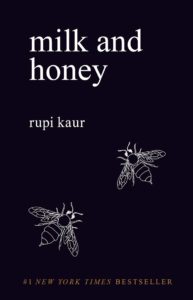Milk and Honey, by Rupi Kaur
REVIEWS, 16 Apr 2018
Sumeet Grover – TRANSCEND Media Service
9 Apr 2018 – A veteran poet often used to say to me in our conversations that “all great poetry is about love and loss.” I couldn’t agree more with her words, but I would add that great poetry is also about discovering meaning in life. Milk and Honey (ISBN 978-1449474256) by the Indian-Canadian poet Rupi Kaur is about love and loss; and it is also about the very uncomfortable subject of abuse. I was recently sitting in a café in Bristol, reading the following lines from this book when a waiter came up to me.
“our knees
pried open
by cousins
and uncles
and men
our bodies touched
by all the wrong people…”
This bright-looking man, who was serving me coffee, remarked: “My wife loves this book! I don’t know what’s great about it.” Only if I could tell him that this book has poems to do with love, heartbreak and abuse. The subject of abuse invokes such a shame, even when reading about it, that I could only smile at him in return. It takes courage for a poet to write about their experiences of abuse in the first person; to cast their vulnerable and damaged self in ink, for millions of people to see. How could Kaur do this? From where did she find that inner place where it was okay to show the world how abuse looks like? These are the questions I ask myself as I flip through the pages of her book and read her poems.
When I first opened this book and started to read it, there was everything unusual about it. Poems which do not have titles, no capitalisations, no punctuations; this book breaks all the rules, it shows that the art of poetry is a living thing, which will be re-invented by each person. On that note, it can be said that this book is a significant contribution to the art of poetry, and a significant encouragement to up and coming poets – to allow them to experiment. The poems in this book are accompanied by sketches, all drawn by Kaur.
And as I read this book over the last few months, an impression that remains with me is that this book feels like one woman’s personal diary of her journey through life. The following poem epitomises this sentiment:
“if I knew what
safety looked like
i would have spent
less time falling into
arms that were not”
On the other hand, there are also poems in this book, which have made me question if they are poems at all, and if they could be published as an individual piece of work; the following poem epitomises my question:
“love made the danger
in you look like safety”
In spite of this book reading like a personal diary and some poems being questionable, as described above, there is such a deep emotion, such a profound sense of self-acceptance in Kaur’s words that the pages in her book support each other and stand together as a volume. Lastly, I want to note that Kaur has the ability to write about suffering, abuse and heartbreak with dignity; although at times, reading through these verses can be an emotionally draining affair.
______________________________________________________
 Sumeet Grover is the founder of Global Poetry, dedicated to creativity, human dignity, dialogue and global citizenship. He is a winner of the Portico Brotherton Open Poetry Prize 2014 and was shortlisted for the Jane Martin Poetry Prize in 2014 & 2015. He has authored three books of poetry: Signals (2017), House Arrest & Disobedience (2015) and Change (2011). Grover is a member of the TRANSCEND Network for Peace Development Environment.
Sumeet Grover is the founder of Global Poetry, dedicated to creativity, human dignity, dialogue and global citizenship. He is a winner of the Portico Brotherton Open Poetry Prize 2014 and was shortlisted for the Jane Martin Poetry Prize in 2014 & 2015. He has authored three books of poetry: Signals (2017), House Arrest & Disobedience (2015) and Change (2011). Grover is a member of the TRANSCEND Network for Peace Development Environment.
This article originally appeared on Transcend Media Service (TMS) on 16 Apr 2018.
Anticopyright: Editorials and articles originated on TMS may be freely reprinted, disseminated, translated and used as background material, provided an acknowledgement and link to the source, TMS: Milk and Honey, by Rupi Kaur, is included. Thank you.
If you enjoyed this article, please donate to TMS to join the growing list of TMS Supporters.

This work is licensed under a CC BY-NC 4.0 License.